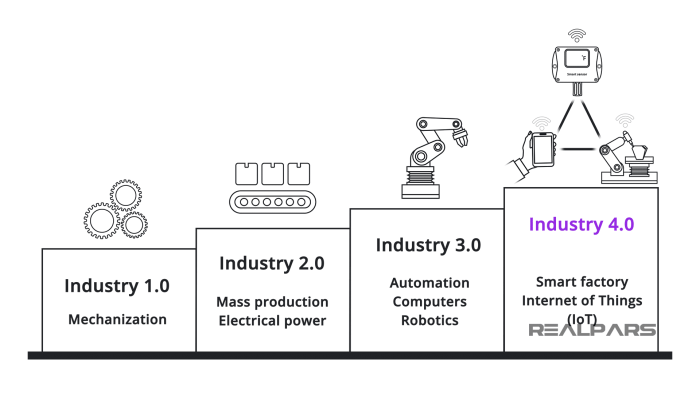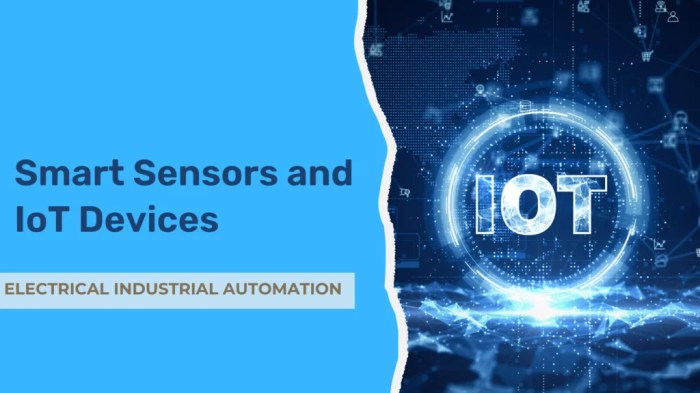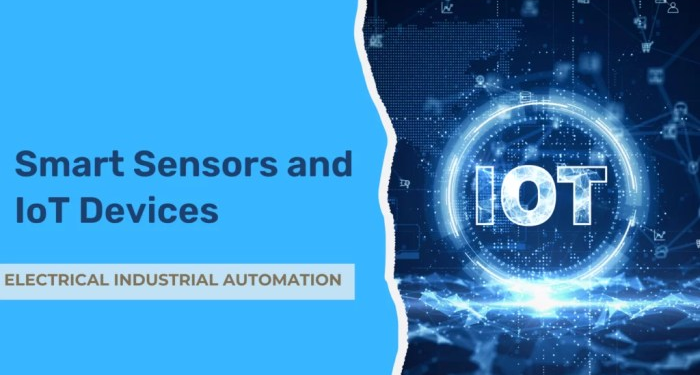Delving into how smart sensors are enhancing industrial automation, this introduction immerses readers in a unique and compelling narrative. Smart sensors play a crucial role in revolutionizing industrial processes, paving the way for increased efficiency and productivity. By understanding the various types of smart sensors and their applications across different industries, we uncover a world where automation is smarter and more adaptive than ever before.
Introduction to Smart Sensors in Industrial Automation
Smart sensors play a crucial role in enhancing industrial automation by providing real-time data and feedback to control systems. These sensors are designed to gather information from the environment and convert it into digital signals that can be analyzed and used to make decisions autonomously.
Types of Smart Sensors
- Pressure Sensors: Monitor pressure levels in various industrial processes such as manufacturing and oil refineries.
- Temperature Sensors: Measure temperature changes to ensure optimal conditions in industrial equipment.
- Proximity Sensors: Detect the presence or absence of objects in the proximity, used in assembly lines and robotic applications.
- Level Sensors: Monitor fluid levels in tanks and containers to prevent overflows or shortages.
Industries Benefiting from Smart Sensors
- Automotive Industry: Smart sensors are used in assembly lines to enhance precision and efficiency in manufacturing processes.
- Oil and Gas Industry: Smart sensors help monitor equipment performance and detect anomalies in drilling operations.
- Food and Beverage Industry: Temperature and humidity sensors ensure quality control and compliance with regulations in food processing.
Benefits of Smart Sensors in Industrial Automation

Smart sensors play a crucial role in enhancing industrial automation by providing real-time data and insights that lead to improved efficiency, productivity, and cost savings.
Improved Efficiency and Productivity
Smart sensors enable automated processes to run smoothly and accurately by continuously monitoring various parameters such as temperature, pressure, and humidity. This real-time data allows for quicker decision-making, optimizing production schedules, and reducing waste in manufacturing operations.
Impact on Predictive Maintenance and Downtime Reduction
Smart sensors can detect potential issues before they escalate into major problems, allowing for predictive maintenance to be carried out proactively. By monitoring equipment health and performance, these sensors help prevent unexpected breakdowns and reduce downtime, ultimately increasing overall equipment effectiveness (OEE).
Contribution to Overall Cost Savings
By improving efficiency, reducing downtime, and enabling predictive maintenance, smart sensors contribute significantly to cost savings in industrial operations. The ability to detect inefficiencies early on, optimize resource utilization, and minimize unplanned downtime all lead to a more cost-effective and streamlined manufacturing process.
Integration of Smart Sensors with IoT and AI

Smart sensors play a crucial role in industrial automation by collecting data and enabling real-time monitoring and control. When these sensors are integrated with the Internet of Things (IoT) and artificial intelligence (AI), their capabilities are further enhanced, leading to more efficient and intelligent systems
Interconnection with IoT
Smart sensors are interconnected with the Internet of Things (IoT) to enable seamless communication between devices and systems. By connecting sensors to IoT platforms, data can be shared and analyzed in real-time, allowing for remote monitoring, predictive maintenance, and data-driven decision-making.
Role of AI in Data Processing
Artificial intelligence (AI) plays a crucial role in processing the vast amounts of data collected by smart sensors. AI algorithms can analyze data patterns, detect anomalies, and predict potential issues before they occur. This enables proactive maintenance and optimization of industrial processes based on real-time insights.
Enhanced Capabilities with IoT and AI
- Condition Monitoring: IoT and AI can enable condition monitoring of equipment by analyzing data from smart sensors in real-time. This helps in identifying potential failures or maintenance needs before they cause downtime.
- Predictive Maintenance: By leveraging AI algorithms on IoT platforms, smart sensors can predict when maintenance is required based on historical data and performance trends. This proactive approach reduces unplanned downtime and extends the lifespan of equipment.
- Optimized Operations: IoT and AI integration allow for the optimization of industrial processes by continuously analyzing sensor data and making real-time adjustments. This leads to improved efficiency, reduced energy consumption, and overall cost savings.
Applications of Smart Sensors in Industrial Automation
Smart sensors play a crucial role in various applications within industrial automation, enabling enhanced monitoring, control, and decision-making processes. Let's explore some real-world examples and the significance of smart sensors in quality control and data-driven decision-making.
Monitoring and Control Systems
Smart sensors are extensively used in monitoring and controlling various parameters in industrial processes, such as temperature, pressure, humidity, and flow rates. For instance, in a manufacturing plant, smart sensors can continuously monitor the temperature of machines to prevent overheating and potential breakdowns.
These sensors provide real-time data to control systems, enabling prompt adjustments and ensuring optimal operation.
Quality Control and Assurance Processes
In quality control, smart sensors are employed to detect defects, deviations, or inconsistencies in products during the manufacturing process. For example, in the automotive industry, smart sensors are used to inspect the dimensions and surface quality of vehicle components, ensuring that they meet the required standards.
By integrating smart sensors into quality control processes, manufacturers can identify and rectify issues promptly, maintaining product quality and customer satisfaction.
Data-Driven Decision-Making
Smart sensors enable data collection and analysis, empowering organizations to make informed decisions based on real-time insights. By monitoring key performance indicators and process parameters, businesses can optimize production efficiency, resource utilization, and overall performance. For instance, in a smart factory, sensors collect data on machine performance and production output, allowing managers to identify bottlenecks, improve processes, and enhance productivity.
This data-driven approach helps organizations streamline operations, reduce costs, and stay competitive in the market.
Epilogue
In conclusion, the integration of smart sensors in industrial automation represents a significant leap forward in technology. From improving predictive maintenance to enabling data-driven decision-making, smart sensors are at the forefront of innovation in the industrial sector. As industries continue to embrace these advancements, the future of automation looks brighter and more efficient than ever.
Frequently Asked Questions
How do smart sensors enhance predictive maintenance?
Smart sensors enable real-time monitoring of equipment health, allowing for timely identification of potential issues before they escalate, thus reducing downtime and maintenance costs.
What role does AI play in processing data from smart sensors?
AI algorithms analyze the vast amount of data collected by smart sensors to identify patterns, anomalies, and trends, enabling predictive insights and proactive decision-making.
Can smart sensors be used for quality control in manufacturing?
Yes, smart sensors play a crucial role in ensuring product quality by monitoring parameters such as temperature, pressure, and vibration, thus maintaining consistency and reliability in the production process.



